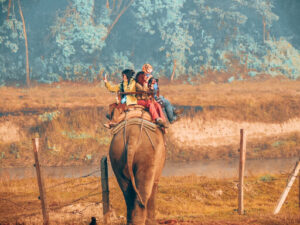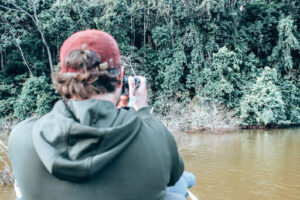In collaboration with Reismeis.nl, Carmen wrote a blog about the importance of ethical wildlife tourism and what you can do, to pitch in.
After this month-long lockdown, everyone is hungry for the same freedom: going on a holiday, exploring new places, and being able to travel freely again. Everyone will have their preferred kind of holiday/travel. One can’t wait to go out in the mountains for a stunning hike, while the other drifts of daydreaming about bounty-beaches.
One of the most unique activities while traveling is spotting wildlife. After all, the animal Kingdom has been on earth for about 600 million years, whereas humans only have entered the stage in the last 125.000 years. Besides this fact, it’s important to know that wildlife doesn’t only have an entertaining function in life. A way more crucial function wildlife has, has to do with the biodiversity of the earth.

All elements that play a role in the balance of biodiversity are plants, soil, animals, the atmosphere, water, and humans. This chain of biodiversity automatically means that when one element in this chain disappears (or changes), it affects the other elements in the chain. Knowing which role wildlife plays in our lives makes it extra unique to witness wildlife in their natural habitat, right?
Let’s dive into the concept of ‘wildlife tourism’. Wildlife tourism can be defined as an activity in which there is a way of interacting with wild animals in their natural habitat. Especially in countries with usually large areas of natural habitats, wildlife tourism is popular. Examples are multiple countries in Asia, but also multiple countries in Africa.
Over the last few years, you have probably noticed that there is more attention to ethical and ecological ways of wildlife tourism. Also, phrased as moral ways of wildlife tourism. You might be wondering which kinds of wildlife tourism can be considered ethical?
WildCRU researchers have researched 24 different types of wildlife tourism and rated these on welfare and conservation criteria. The welfare got scored on different levels that have to do with the freedom of wildlife. The conservation got scored on elements such as the vulnerability of the wildlife. The five most horrific kinds of wildlife tourism conform to the research are as following:
- Riding elephants
- Taking tiger selfies
- Walking with lions
- Visiting bear parks
- Holding sea turtles

Knowing this, you can already make a more ethical and ecological choice in the future when wanting to spot wildlife. Also, this information can be used while visiting places like sanctuaries. With the help of TripAdvisor, you can read reviews on the forehand to find out how ethical and ecological the wildlife sanctuary is. But did you know that research has shown that over 80% of the reviews for wildlife sanctuaries on TripAdvisor are written positively even when the welfare standards are poorly? Only the minority of the visitors write a review that is complementary to the actual welfare standards of the visited sanctuary. Quite shocking, right?! These, at least, 80% of positive reviews supposedly maintain a psychological process, where visitors pay less attention to the ethical criteria because they have read a positive review.
When searching for an ecological wildlife tour or sanctuary, you could do something else, besides reading written reviews on TripAdvisor. You could search for places that use the word ‘ecological’ in their brand(name). Or an agency that works with the term ‘ecotourism.’ Though, did you know that every travel agency is free to use these words? It, therefore, is never a guarantee that the tour, sanctuary, or agency you want to book actually works ethically and ecologically.
It will be clear by this point what the essence is of wildlife for the earth. Also, it has appeared that picking an ethical and ecological wildlife tour isn’t that simple. Time to give six tips that will help you book an ethical wildlife tour!

- While most wildlife sanctuaries score rather well on the welfare and conservation criteria, we advise booking a tour that goes into the WILD. Book a safari or go on a wildlife tour that takes you into the deep jungle. There is nothing more beautiful than seeing how wildlife lives in their natural habitat.
- As mentioned, a high score on TripAdvisor isn’t a guarantee that the wildlife tour or sanctuary treats animals ethically and ecologically. Make sure that while researching on TripAdvisor, that you always read into the reviews with 1 or 2 stars. These reviews will provide you with valuable information about the place.
- The Green Stamp did the groundwork for you: through their online platform, you can see per continent which wildlife tour works ethically and ecologically. Through the Green Stamp, you can book these tours as well. Fun fact: all featured wildlife projects on the Green Stamp donate per visitor to a local (green) good cause!
- While walking around in a sanctuary, look around: is there clean drinking water available for the animals? How do their stalls look like? Are the stalls spacious and quiet? Is there space for the animals to withdraw themselves from the visitors? All these options are important for ethical sanctuaries.
- In general, wildlife isn’t too big of a fan of big groups of people and hard/loud sounds. If these elements present themselves to wildlife this usually causes stress. A lot of stress. Besides the event of big groups or loud sounds, there are many sanctuaries where the reaction to stress by wildlife, is punished. Places where big groups of people get together or places where loud sounds occur are absolute no-go’s!
- Wildlife tours or wildlife sanctuaries where they offer things like holding wildlife or taking selfies with the wildlife? Ask for a refund, leave the place, and write a negative review about the place. In case you see physical wounds or when animals are chained, it’s a no-brainer to turn around instantly.

With all this information, we believe you’re ready to make an ethical choice when it comes to spotting wildlife in any kind of way!
Do you have other tips for us or information we should know? Leave a comment below!


